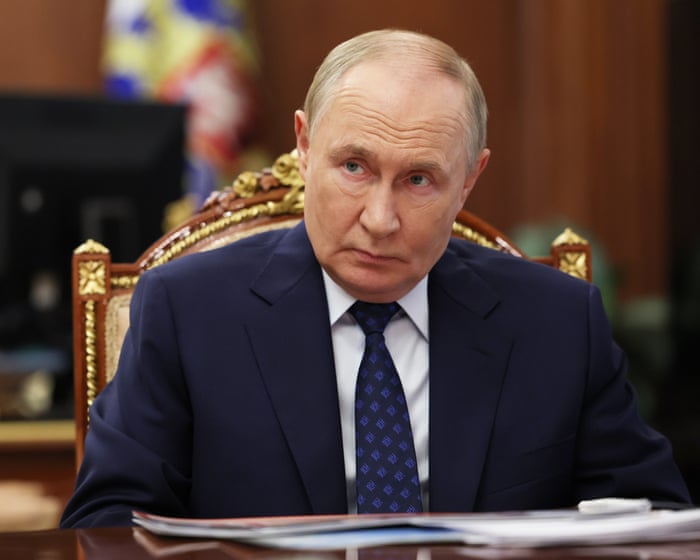A pro-Kremlin commentator, who for years praised Vladimir Putin as one of history’s great leaders on international media, has also served as a military blogger, an ardent fundraiser for Russian forces, and a promoter of openly genocidal language against Ukraine. Similarly, a Ukrainian-born volunteer soldier and state-run RT network commentator expressed regret that Russia did not begin its full-scale invasion earlier.
These are the types of individuals who have flourished in Putin’s Russia in recent years, where steadfast loyalty and militant support for the war in Ukraine were rewarded with wealth, prestige, and power. However, all three—along with other outwardly pro-Kremlin figures—have recently become targets of the very state they once lauded, as its repressive apparatus turns inward.
Sergei Markov, a political analyst, and Roman Alyokhin, a pro-war blogger, were both labeled “foreign agents” this year, a term previously used against Putin’s critics. This designation, reminiscent of the Soviet era, requires them to identify as foreign agents on social media and in publications, while also imposing severe financial restrictions.
Tatyana Montyan, the Ukrainian-born commentator, was recently classified as a “terrorist and extremist,” a label typically reserved for those the Kremlin deems its most dangerous adversaries, such as associates of the late Alexei Navalny.
Analysts suggest these cases indicate a new trend: a purge not only of dissenters but also of the regime’s own supporters, as rival factions within the system clash. “First, they targeted anti-war voices. Now that there are none left, the repressive machine cannot be halted,” remarked Russian political scientist Ekaterina Schulmann.
Moscow has not provided an official explanation for these crackdowns, and each case appears to have different surface triggers. Markov, known for his connections to Azerbaijan’s political elite, is believed to have fallen out of favor after relations between Moscow and Baku deteriorated sharply. Alyokhin was accused of misusing funds raised for troops after flaunting a new sports car and expensive watch online. Montyan has also faced allegations of misappropriating donations for the front lines.
Beneath these apparent reasons, observers note a deeper conflict. Schulmann describes it as a struggle between two rival groups: the established propagandists closely tied to the defense ministry and the Kremlin, known as “loyalists,” and the widespread grassroots movement of ultranationalist war supporters called “militarists” or Z-bloggers, named after the symbol of the invasion.
Comprising hundreds of prominent bloggers and volunteer activists, this network emerged shortly after Putin’s full-scale invasion of Ukraine in 2022, when it became evident that the military often lacked basic equipment and support. They have raised funds, purchased drones and vehicles, and delivered supplies directly to the front lines.
The hardline “militarists” have occasionally criticized the conduct of the war, and their relative independence from the state has prompted Moscow to sanction attacks against them. “Autocracies fear any form of civic mobilization,” Schulmann explained. “Any genuine movement, even a pro-war one, is seen as obstructive and potentially threatening.”
The Kremlin has previously taken steps to rein in parts of the pro-war movement that slipped from its control, most notably by imprisoning prominent far-right commentator Igor Girkin in 2024. With billions of rubles funneled into the war in Ukraine, financial disputes have also become a source of tension.
At its core, the conflict reflects a power struggle within the system.”Their conflict is a battle for resources,” explained Ivan Philippov, a Russian researcher and writer focusing on the country’s pro-war movement. He noted that Vladimir Solovyov, a prominent television propagandist and the public face of the “loyalist” faction with close defense ministry ties, has led the charge to remove pro-war bloggers and volunteers. Reportedly, Solovyov was upset that many of them raised more funds for the war effort than his own state-sanctioned charity.
Russia’s long-standing anti-Putin opposition has not missed the irony of this crackdown.
“It’s been amusing to see those who never protested when liberals were jailed now realizing that justice in Russia is selective, and that anyone can be imprisoned without reason,” Philippov remarked. This situation mirrors the old Soviet plea, “Comrade Stalin, a terrible mistake has been made!”—a cry once made by loyal communists who discovered too late that Stalin’s purges would not spare even the devout.
“It’s some sort of misunderstanding,” Markov protested shortly after being designated a foreign agent.
Alyokhin used terms more typical of human rights organizations, criticizing the foreign agents law for “violating the Russian constitution” and representing “a serious infringement of civil rights.”
Schulmann anticipates further arrests. With most of Russia’s anti-war dissenters already imprisoned or exiled, she said, the system is now compelled to seek out new adversaries.
“The Russian repressive apparatus has quotas to meet. The machine must continue to sustain itself,” she added.
Frequently Asked Questions
Of course Here is a list of FAQs about the reported focus on prowar individuals within Russia framed in a natural tone with direct answers
Basic Understanding Definitions
1 What does it mean that the system is focusing on prowar people
It means the government is actively identifying supporting and promoting individuals and groups who strongly support the war while marginalizing or silencing those who oppose it
2 Who are considered prowar individuals in this context
This includes military bloggers state media personalities politicians and ordinary citizens who publicly and enthusiastically endorse the war effort and the governments actions
3 Why would an oppressive system need to focus on its own supporters
Even among supporters there can be criticism about how the war is being managed The system aims to control the narrative completely ensuring that all prowar messaging aligns with the official state line and doesnt foster dissent
Motivations and Goals
4 What is the main goal of this focus
The primary goal is to maintain and strengthen public support for the war mobilize resources and create a unified front by amplifying loyal voices and suppressing any internal criticism
5 How does this help the government
It helps create an atmosphere of total consensus making the war effort seem universally supported This can boost military morale discourage internal opposition and reinforce the governments legitimacy
6 Arent these people already on their side Why the extra effort
Yes but by officially endorsing and platforming them the state coopts their influence This turns independent supporters into managed assets ensuring their passion doesnt evolve into criticism of military strategy or leadership
Methods and Examples
7 How is the government actually doing this in practice
Through state media giving them a platform awarding them state honors promoting their social media channels and using their content as official propaganda In some cases they may be given political roles
8 Can you give a real example
Prominent military bloggers sometimes called war correspondents who have large online followings are often featured on major state TV channels Their critiques of military setbacks are sometimes tolerated but they are always framed within a narrative of ultimate victory and patriotism
9 What happens to prowar people who start to criticize the governments strategy
They often face consequences They might be censored have their



